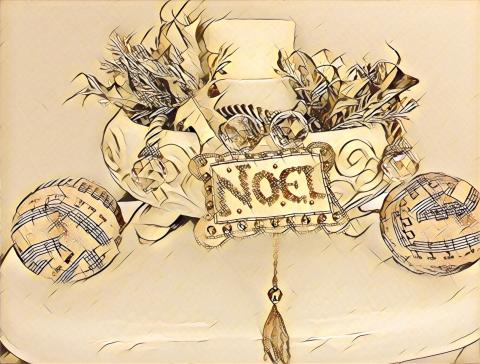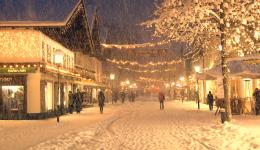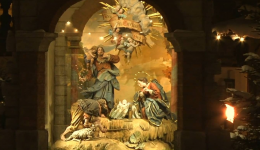Category:
Hebrews 2:11 – “Both the one who makes mankind holy and those who are made holy are of the same family. So Jesus is not ashamed to call them brothers.”
To think about Christmas, and following that - all the implications of what it means that in Jesus God became flesh and lived among us, on our planet for awhile.
Author George Elliott wrote: “Ideas are poor ghosts until they become specific in another person; and then they reach out to us with fiery hands and shake us like a passion.” God’s idea (the 'logos') – God’s Word became flesh and dwelt among us and, thank God, this Word – this loving, living Person has seized the imaginations of millions today and through the ages, grabbing our lives like a passion. Each Christmas we contemplate and celebrate the wonder of the Savior’s birth. We remember that the wondrous plan of God for the world’s redemption was an immensely fragile plan. One writer speaks of God’s plan in Christ as, “ultimate mystery – born with the skull you could crush one-handed.”
The Hebrews text tells us something about 'Family'
The Son of God in the person of Jesus is of the “same family” as are all who believe, those who are of faith and who thus have become 'children of God.' Through Christ we have become sons and daughters of God, the Heavenly Father. We have become joint-heirs with Christ, an inheritance that was secured for us by His death. But first of all, He had to be made like us. St. John writes in the prologue to his Gospel that “He (i.e. Jesus) came to His own.” We know that “His own” were, first of all, the Jewish people, the ancient 'People of God' who were God's own possession. In the coming of Jesus the Christ, God has remembered His love and all of His covenant promises to His people. Pope Pius IX said once that 'in spiritual matters we are all Semites; we owe a great debt to Judaism.' Indeed.
But now the mark of God’s own chosen people is that through faith, whether Jew or nonJew ('Gentiles' as Scripture puts it), all who believe in God's work in Jesus, in Who He is and what He has done and will yet do, they are included with those who are 'blessed with faithful Abraham' since they have been led by God’s Spirit to enter and share in the life and journey of faith that is inherent in following Jesus the Messiah. The ancient promises of God to His people and to their seed for ever were and continue to be promises that are to be received by 'spiritual descent' more than by natural or physical dissent. Indeed, as St. Paul points out in his letter to the church at GalatiaL Christ is the seed of Abraham, and if we are in Christ through faith then we are joined to God in and with Him, and again, have become and heirs to the covenant promises of old.” The Scriptures teach that, “the just shall live by faith.” And, “those who are of faith are blessed with faithful Abraham.”
Whether male or female, Jew or Gentile, slaved or free, we are all one in Christ Jesus – brothers and sisters of God’s Son, the Messiah. The plan of God for the cosmos, and for each one of us individually, was a family plan. It was personal as well as corporate and for the entire commonwealth of God's People. We are called 'the children of God' and Jesus identifies with us as such, for he is the Son of God. In a sense, Jesus is our older brother.
Jesus was not 'Ashamed'
The grace and compassion of God in Christ is revealed in that he came to take our full humanity upon Himself. He was tempted and tried in every way just as are we, and yet he remained without sin. His identity with us is remarkable. King Edward VII once invited a farmer to tea, but no sooner was the tea poured that the farmer tipped some into his saucer and proceded to drink, as was his rude, rural custom. The royal court and guests smiled and tittered but the room fell silent as the king gravely poured tea into his own saucer and drink along with the farmer. God pities us – remembering that we are frail children of dust, that the rebellion of the heavenlies has so touched our world and so touched each one of us that each of us is tainted and corrupted by evil. Whatever else we may be we are not what we could and should be, nor what we shall yet be because of Jesus.
We note God’s loving initiative and persistence with us in that He so loved the world (the cosmos, which means peope, places and things) that He sent His Son. God has not given up on this old world nor on any one of us. God continues, like a mighty hound of Heaven as the poem has it, in a mysterious and relentless pursuit. Even in the midst of the black tragedy of Golgotha Hill, and despite every rebellious act of men and women in time and space, Jesus prays – “Father forgive them for they know not what they do.”
Underline the word 'Holy'
“Both the one who makes us holy and those who are made holy are of the same family.”
The holy Son of God was born, lived, died and was raised again, and exalted to God's right hand (the place of right, privilege and power), in order that we might be made holy. The Latin word “sanctus” gives us the English “sanctification.” But however we say it, God’s plan is that we be like Jesus, like God, free from sin and pure in mind, soul and body: without blemish. The Old Testament sense of holiness was that of being completely set-aside for God’s use, for His intended use of a particular person or object. Even the ordinary pots and pans in the worship of the Temple in Jerusalem were to be holy -- instruments and vessels totally dedicated as vessels of honour, uniquely created and set aside for God’s will and purpose.
Dr. Morris Boyd once said, “Wrongness distorts everything, even our best love. The most noble of our loves is infused with self-interest. It is not simply our badness that needs to be repented of – it is our goodness that is imperfect.” To be holy is to be like Jesus and we become more and more like Him as we spend time with Him, listening to His Word, looking at His ways, seeing Him in the faces and places of our every day as we open ourselves to paying attention to what God is doing in and through us, and in our world. George MacDonald wrote that 'God never gives us a thing to do concerning which it would be irreverent to ponder how the Son of God would have done it.” In short, we should indeed ask: 'What would Jesus do?' Mother Teresa said once, thereby explaining her whole life’s work, “We have to become Christ to one another.” Immersed in the same wonderful pursuit, Emerson Fosdick wrote, “Our Lord lived his life like music to be played over again.” Oh to spend the Christmas season, and each day following, seeking to see with our Lord's eyes, and feel with his heart, and move with his compassion, and love with his mercy.
Frederick Buechner writes of the retirement of one of his Old Testament professors at Union Seminary; “I am told that a number of students from the Jewish seminary across the street attended his final lecture and, before entering the great room, left their shoes in the core door to indicate that the ground in which they stood with him was 'holy ground.'” What a wonderful witness to this man and to the life he had lived to that point.
And yet, the goal and the potential of every follower of Christ is that he or she can be and will be one day fully restored to the created wonder of who God intended us to be, to be realized so that no sin or heart of pride and rebellion will stick any longer to us, or stem from our deep heart. “Ah,” cried Robert Browning – “but a man’s reach should exceed his grasp, or what ‘s a heaven for?!”
It is staggering to think that by God's Spirit, the Spirit of Jesus, working within us and because of the finished work of Jesus and His continuing example for us, God is preparing us for a New Creation, a new world – and perhaps for worlds yet undiscovered or known - for rooms (planets?) and galaxies in an expanding universe, in the stuff of the stars. Through faith i Jesus we have been made 'positionally whole' and one day we shall be entirely whole and holy, for 'we shall be like Him,' as John writes in first John (3:1-3) - ”for we shall see Him as He is.”
CS Lewis wrote a book entitled 'The Weight of Glory' and included this compelling thought: - “It is a serious thing to live in a society of possible gods and goddesses, to remember that the dullest and most uninteresting person you talked to may one day be a creature which, if you saw it now, you would be strongly tempted to worship, or else a horror and a corruption, such as you now meet, if at all, only in a nightmare. All day long, we are in some degree helping each other to one or the other of these two destinations. It is in the light of these overwhelming possibilities – it is with the all and the circumspection proper to them, that we should conduct all our dealings with one another -- all friendships, all loves, all play, all politics. There are no ordinary people.”
None of us is ordinary. Jesus makes us holy. Again Buechner - encouraging us to consider that Jesus says not “at the end of the end of the way you may find me,” – he says, “I am the Way; I am the road under your feet, the road that begins just as low as you happen to be.” If we are in a hole, the way begins in the hole. The moment we set our feet in the same direction as His, we are walking with God.”
It is Jesus who walks with us for He came to us in plain folk’s flesh, joined the family of humankind that we might become His brothers and sisters and thus: sons and daughters of the Heavenly Father.
Like Mary who pondered the events of Christmas and the life of Christ in her heart constantly, may we too underline, consider and remember these words -- Family, unashamed, holy . . . drawn from this simple but profound text in Hebrews.
For the holy child that was conceived and born in Mary is the Hope and the Savior of this world -- its ony hope and for each one of us.








